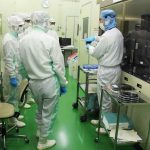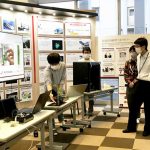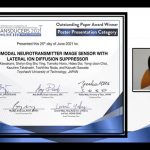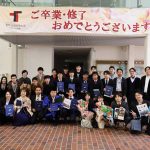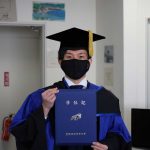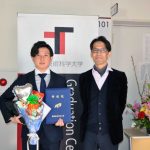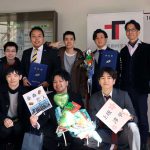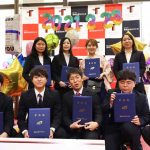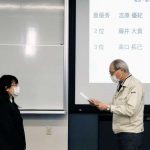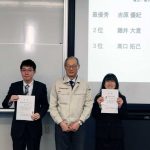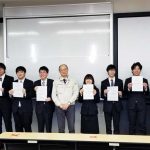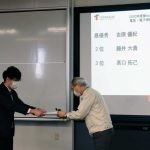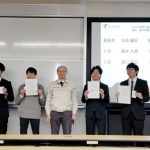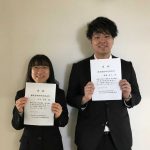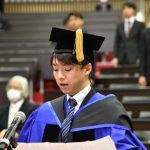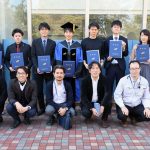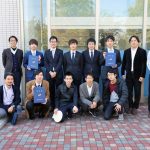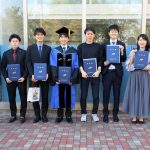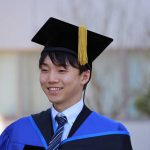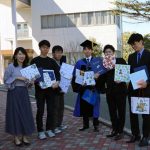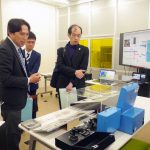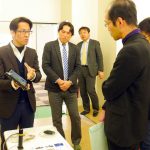Topix
Demonstration at the Advanced Technology Tour of the Practical MOT (Management of Technology) Course
2021/11/02 Topix
The 6th lecture of the 8th Practical MOT (Management of Technology) Course for Small and Medium Enterprises – Innovation and Product Development in the New Normal Era! -was held at the Electronics Advanced Integration Laboratories. This MOT course is an eight-session course that aims to help students acquire various MOT perspectives for successful product development in an era of social structural change.
In this lecture, titled “Toyohashi University of Technology, Advanced Technology Tour – Semiconductor Sensing Technology for Society 5.0,” after receiving explanations on semiconductor development and sensing technology from Professors Sawada and Noda, the participants were divided into two groups to observe and experience the semiconductor manufacturing equipment and sensing device demonstrations in the LSI plant. The participants were then divided into two groups to observe and experience demonstrations of semiconductor manufacturing equipment and sensing devices in the LSI plant.
IEEJ 2021 E Section General Study Group
2021/07/26 ConferenceTopix
Date: Monday, July 26, 2021 – Tuesday, July 27, 2021
Method of presentation: Online, Oral presentation
- Rintaro Tsubouchi, Junpei Uesaka, Kosuke Go, Toshihiko Noda, Kazuaki Sawada, Kazuhiro Takahashi
Improvement of fQ product of cavity-encapsulated graphene resonators using strain application technique
FY2021 General Meeting of Sensors and Micromachines Division, IEEJ, MSS-21-046, July 27, 2021 - Takeshi Wada, Ryomei Wada (Toyohashi University of Technology), Manase Mizutani, Yoshihisa Suzuki (SINTOKOGYO, Ltd.), Yong-Joon Choi, Kazuhiro Takahashi, Kazuaki Sawada, Toshihiko Noda (Toyohashi University of Technology)
Verification of detection characteristics of gas sensor combined with gas permeability control element
FY2021 General Meeting of Sensors and Micromachines Division, IEEJ, Chemical Sensors Research Group, CHS-21-024, July 27, 2021 - Yukihiro Tatsumi, Tomoko Horio, Kensuke Murakami (Toyohashi University of Technology), Ken Ogasawara, Satoshi Shimizu (Toho Kasei Co., Ltd.), Yong-Joon Choi, Kazuhiro Takahashi, Toshihiko Noda, Kazuaki Sawada
Operation check of pressure-ion image sensor in solution
FY2021 General Meeting of Sensors and Micromachine Division, The Institute of Electrical Engineers of Japan, BMS-21-029, July 27, 2021 - Kenta Sembo, Taichi Yoshida, Runa Honjo, Seitaro Toda, Tomoko Horio, Yasuyuki Kimura,Yong-Joo Choi, Kazuhiro Takahashi, Kotaro Takayama, Kazuaki Sawada, Toshihiko Noda
Verification of ion distribution measurement in stems using a plant implantable ion image sensor
FY2021 General Meeting of Sensors and Micromachine Division, The Institute of Electrical Engineers of Japan, Biomicrosystems Research Group, BMS-21-031, July 27, 2021 - Mai Madokoro, Yasuyuki Kimura, Tomoko Horio (Toyohashi University of Technology), Hiroshi Horiuchi, Junko Ishida (National Institute of Natural Sciences),Yong-Joo Choi, Kazuhiro Takahashi, Toshihiko Noda (Toyohashi University of Technology), Junichi Nabekura (National Institute of Natural Sciences), Kazuaki Sawada (Toyohashi University of Technology)
Improvement of measurement system of implantable pH image sensor for free behavior experiment in mice
FY2021 General Meeting of Sensors and Micromachine Division, IEEJ, BMS-21-032, July 27, 2021
Received two awards at TRANSDUCERS 2021
2021/06/25 AwardsConferenceTopix
Outstanding Paper Award Winner Poster Presentation Category
Chinatsu Kawakami, Shirlyn Eng Shu Ying, Tomoko Horio, Hideo Doi, Yong-Joon Choi, Kazuhiro Takahashi, ○Toshihiko Noda, and Kazuaki Sawada
MULTIMODAL NEUROTRANSMITTER IMAGE SENSOR WITH LATERAL ION DIFFUSION SUPPRESSOR
Outstanding Paper Award Winner Oral Presentation Category
Kotaro Sakamoto1, ○Mai Madokoro1, Hiroshi Horiuchi2, Junko Ishida2, Tomoko Horio1, Yasuyuki Kimura1, Takeshi Hizawa1, Yong-Joon Choi1, Kazuhiro Takahashi1, Toshihiko Noda1, Junichi Nabekura2 and Kazuaki Sawada1
1Toyohashi University of Technology, JAPAN and 2National Institute for Physiological Sciences, JAPAN
NEEDLE-TYPE 5-µM PIXEL PITCH Ph-IMAGE SENSOR AND IMAGING OF PROTON EMISSIONS IN THE CEREBRAL CORTEX
TRANSDUCERS 2021
2021/06/25 ConferenceTopix
We presented our research results at The 21st International Conference on SOLID-STATE SENSORS, ACTUATORS and MICROSYSTEMS (TRANSDUCERS 2021).
Conference : The 21st International Conference on SOLID-STATE SENSORS, ACTUATORS and MICROSYSTEMS (TRANSDUCERS 2021)
Conference Period: June 20-25, 2021
- Chinatsu Kawakami, Shirlyn Eng Shu Ying, Tomoko Horio, Hideo Doi, Yong-Joon Choi, Kazuhiro Takahashi, Toshihiko Noda, and Kazuaki Sawada
MULTIMODAL NEUROTRANSMITTER IMAGE SENSOR WITH LATERAL ION DIFFUSION SUPPRESSOR
The 21st International Conference on SOLID-STATE SENSORS,ACTUATORS and MICROSYSTEMS (TRANSDUCERS 2021),B2-211b, poster, ONLINE Virtual Conference, 22 Jun, 2021. - Hayato Muraguchi1, Hideo Doi1, Tomoko Horio1, Bijay Parajuli2, Eiji Shigetomi2, Youichi Shinozaki2, Yong-Joon Choi1, Kazuhiro Takahashi1, Toshiaki Hattori1, Toshihiko Noda1, Schuichi Koizumi2, and Kazuaki Sawada11Toyohashi University of Technology, JAPAN and 2University of Yamanashi, JAPAN
A MULTI-CHEMICAL IMAGE SENSOR FOR SIMULTANEOUS VISUALIZATION OF LACTATE AND Ph DISTRIBUTION AND ITS APPLICATION FOR EXTRAC ELLULAR MEASUREMENT OF A HIPPOCAMPAL SLICE
The 21st International Conference on SOLID-STATE SENSORS,ACTUATORS and MICROSYSTEMS (TRANSDUCERS 2021),B3-3D2, Oral, ONLINE Virtual Conference, 23 Jun, 2021. - Kotaro Sakamoto1, Mai Madokoro1, Hiroshi Horiuchi2, Junko Ishida2, Tomoko Horio1, Yasuyuki Kimura1,Takeshi Hizawa1, Yong-Joon Choi1, Kazuhiro Takahashi1, Toshihiko Noda1, Junichi Nabekura2,and Kazuaki Sawada1
1Toyohashi University of Technology, JAPAN and 2National Institute for Physiological Sciences, JAPAN
NEEDLE-TYPE 5-μM PIXEL PITCH Ph-IMAGE SENSOR AND IMAGING OF PROTON EMISSIONS IN THE CEREBRAL CORTEX
The 21st International Conference on SOLID-STATE SENSORS,ACTUATORS and MICROSYSTEMS (TRANSDUCERS 2021),B3-3D1, Oral, ONLINE Virtual Conference, 23 Jun, 2021. - Kenta Sembo, Taichi Yoshida, Seitaro Toda, Tomoko Horio, Yasuyuki Kimura, Yong-Joon Choi, Kazuhiro Takahashi, Kotaro Takayama, Kazuaki Sawada, and Toshihiko Noda
REAL-TIME IN VIVO IMAGING OF INTRA-STEM ION DISTRIBUTION USING INSERTABLE CMOS SENSOR FOR PLANTS
The 21st International Conference on SOLID-STATE SENSORS,ACTUATORS and MICROSYSTEMS (TRANSDUCERS 2021),B3-3C3, Oral, ONLINE Virtual Conference, 23 Jun, 2021. - Tomoya Ide, Yong-Joon Choi, Yasuyuki Kimura, Takeshi Hizawa, Kazuhiro Takahashi, Hiromu Ishii, Toshihiko Noda, and Kazuaki Sawada
REALIZATION OF ON-CHIP MICROFLUIDIC SYSTEM WITH FILTER-FREE FLUORESCENCE SENSOR FOR LENS-LESS FLOWCYTOMETRY
The 21st International Conference on SOLID-STATE SENSORS,ACTUATORS and MICROSYSTEMS (TRANSDUCERS 2021),B2-2D3, Oral, ONLINE Virtual Conference, 22 Jun, 2021. - Hideo Doi, Tomoko Horio, Young-Joon Choi, Kazuhiro Takahashi, Toshihiko Noda, and Kazuaki Sawada
REDOX-TYPE LABEL-FREE ATP IMAGE SENSOR FOR HIGHLY SENSITIVE IN VITRO IMAGING OF EXTRACELLULAR ATP
The 21st International Conference on SOLID-STATE SENSORS,ACTUATORS and MICROSYSTEMS (TRANSDUCERS 2021),B2-214b, poster, ONLINE Virtual Conference, 22 Jun, 2021.
Mr. Hideo Doi (D3) appeared on FM Toyohashi, a local FM radio station.
2021/06/19 InformationTopix
Mr. Hideo Doi appeared on FM Toyohashi, a local FM radio station.
In collaboration with the local FM radio station FM Toyohashi (84.3MHz), we broadcast the program “Tempaku no Shiro Gikadai” every Saturday evening after 5:00 p.m. to introduce the research and educational activities of our university to a wide audience.
In this program, Mr. Yoshio Watanabe, a popular personality of FM Toyohashi, visits various laboratories and circles in our university and talks about the “What? Why? Why? in an easy-to-understand manner.
The program will be broadcast on Saturday, June 19, 2021, after 5:00 p.m. as follows
Speaker: Hideo Doi, 3rd year doctoral course student, Department of Electrical, Electronics and Information Engineering
Title: To ward Physiological Applications of Ion Image Sensor Technology
Broadcasting station: FM Toyohashi (84.3MHz)
Broadcast time: Saturday evenings from after 5:00 p.m.
Program name: “Tenhaku no Shiro Gikadai” (in “84 no 3 (Yashi no Mi) Wave THE BURRN”)
Graduate and Undergraduate Graduation Ceremonies for FY2020 were held.
2021/03/23 EventsInformationTopix
Graduate and Undergraduate Graduation Ceremonies for FY2020 were held.I look forward to the future activities of those who have graduated.
Examination of master’s degree thesis
2021/02/19 Topix
Master’s Thesis Final Examination was held.
The following members of our group were awarded for their outstanding dissertations.
Best Presentation Award: Chinatsu Kawakami
Excellent Presentation Award:Ryohito Kanamori
This year, the presentation was made online.
I would like to express my appreciation to all the M2 students for their hard work.
Thank you very much for your hard work.
The 1st OPERA-RA Seminar
2020/10/22 InformationTopix
The JST OPERA Industry-Academia Collaboration Platform Joint Research Program is promoting the “Creation of multimodal sensing technology to visualize physical and chemical information at the micron level”. In this program, doctoral students are participating in joint research with companies as RAs. D3 Mr. Takahashi gave a lecture at the 1st RA seminar.
JST OPERA Multimodal Sensing Co-Creation Consortium held the 1st RA Seminar
Speaker:
Graduate School of Engineering, Toyohashi University of Technology
Department of Electrical, Electronic and Computer Engineering
Mr. Toshiaki Takahashi
Title: Development of MEMS Optical Interference Surface Stress Sensor to Detect Arbitrary Biomolecules with High Sensitivity
Date & Time: October 22, 2020 (Thursday) 12:30-13:00 (ZOOM)
The 2019 Graduate School Graduation and Undergraduate Graduation Ceremonies were held.
2020/03/23 InformationTopix
This year, in consideration of the spread of the COVID‑19, the ceremony was held on campus with a small number of graduates of the doctoral course, representatives of each department, and representatives of each course.
Visit from Deputy Director-General of the Minister’s Secretariat, Ministry of Economy, Trade and Industry (in charge of Industrial Science and Technology Policy and Environment Bureau)
2020/03/12 InformationTopix
2020/3/12 Mr. Watanabe, Deputy Director-General, Industrial Science and Technology Policy and Environment Bureau, Ministry of Economy, Trade and Industry, and Mr. Baba, Office for Promotion of University Collaboration, Technology Promotion and University Collaboration Promotion Division, Industrial Science and Technology Policy and Environment Bureau, visited our group and observed our research.

